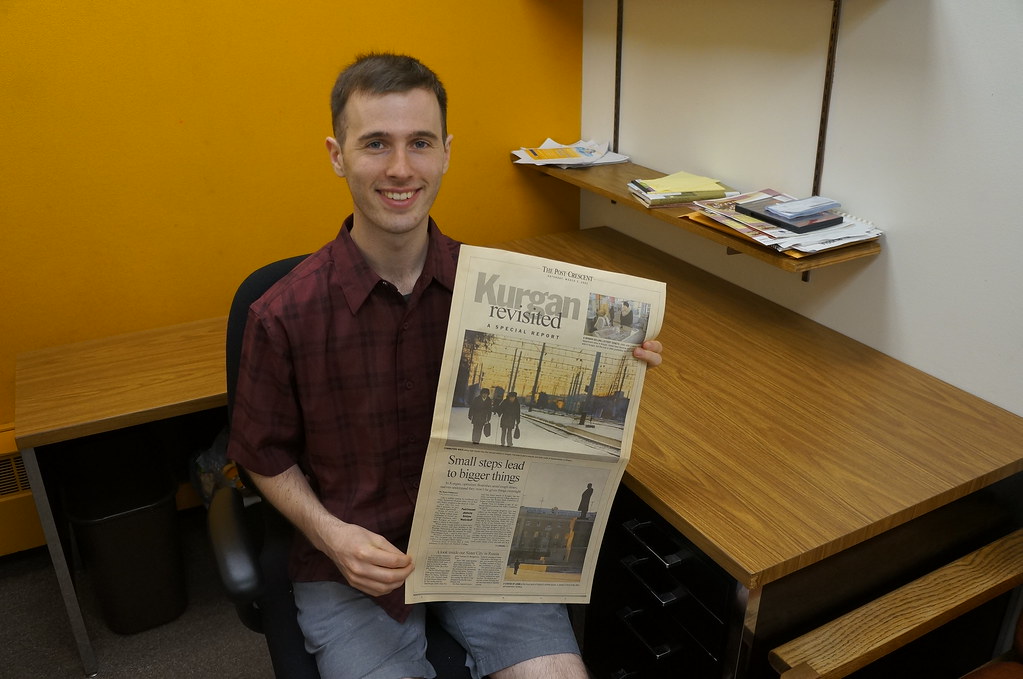John O’Neill is a double-degree student from Reno, Nevada. He’s been at Lawrence for five years and will earn his BM in French Horn Performance and his BA in Russian and Government in a just few short weeks!
John is also a much-beloved library student worker, and has been the night supervisor at the Circulation Desk. He definitely knows his way around the Mudd and offers great insight into using the library to your best advantage.
Upon being asked what he would like his fellow students to know about the Mudd Library, he responded,
“Get to know the staff, don’t be afraid to ask questions, and always go upstairs to find your own books because you will come down with an entire stack of useful materials.”
Read on to learn more about John and the fascinating and important research he’s been pursuing in the Mudd!

John, what are your plans after graduation?
I am planning to travel to Ukraine for the summer to work with an NGO there that works with under-served regions of the country. After that I will be back in Appleton and hopefully onto Chicago in the fall.
What have you been researching in the Mudd Library?
Over the past two terms I have been working on my senior experience in government. For this project I am profiling the Fox Cities-Kurgan Sister City Relationship. The partnership had an astonishing period of peak activity from the 1990s through 2013, but it has since been dormant. Some of the partnership’s major accomplishments included a 2003 security summit hosted in Appleton with keynote from Mikhail Gorbachev, opening of medical facilities and a domestic violence shelter in Kurgan, obtaining funding for a project to decommission a significant stockpile of chemical weapons in the Kurgan region, and over 100 educational exchanges between universities, high schools, and middle schools in both regions.
What library materials and resources have been the most useful to you in pursuing this research?
For this project I ended up using a wide variety of resources that the library offers students. I took advantage of the main collection, ILL, and electronic databases for most of my background research. Later, I relied on our wonderful reference librarians, who pointed me to contacts at the Appleton Public Library and the Appleton Historical Society. Finally, I learned to be grateful for the VCRs and microform readers that the library makes available to students. Most of my resources were on VHS tapes from the 90s, so having those VCRs on hand was absolutely fantastic.
What are you hoping to learn or gain from this research?
One of my main objectives was to learn how sustainable local organizations are built. This involved finding out how Fox Cities-Kurgan got its start, what program leaders hoped to accomplish, and why it eventually entered a decline. As I progressed in my research I found many other sister cities around the country with similar stories of huge growth followed by a swift decline. This led me to ask just how much these relationships are subject to the broader political climate and what their place is in the global geopolitical environment.
Why do you think this research is important?
For me, The Fox Cities-Kurgan Partnership has been an inspirational example of international partnership that transcends political boundaries. Not only did the program accomplish some enormous objectives that we wouldn’t normally associate with smaller towns like Appleton, but it also forged lasting friendships between the countless exchange participants, volunteers, host families, and students who were involved. By increasing awareness of the program I hope to re-spark the interest in international advocacy that the program was founded around.
How did you become interested in this line of research?
A couple of years ago I found the partnership’s website, which hadn’t been updated since 2013. I later tried to search for Kurgan on the Post Crescent’s website, but due to archiving of the newspaper, my search returned no results. The disappearance of this program from the public eye made me a little sad and I began reaching out to program leaders and participants to find out more.
John, this sounds like really important work. We are so excited to see where you take what you’ve learned and to see the grand adventures that are in store for you! Thank you for sharing.
Save